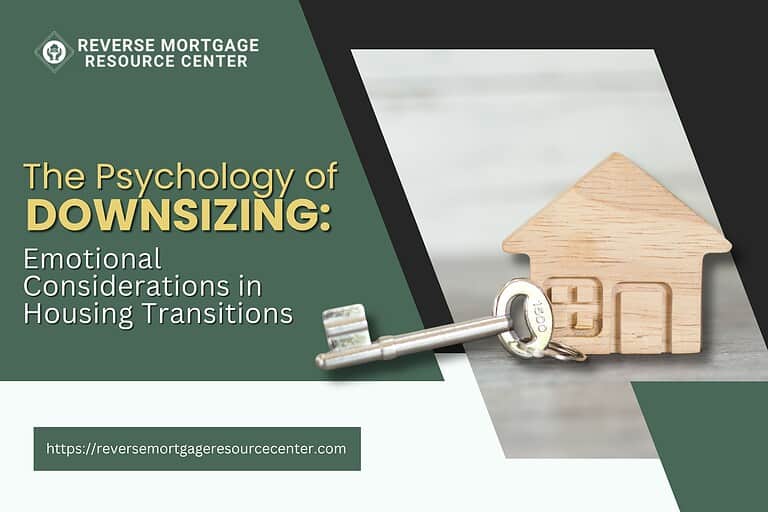Reverse Mortgages and Downsizing: Simplifying Life in Retirement
As seniors approach retirement, financial challenges often become a significant concern. Many find themselves at a crossroads, grappling with the decision to downsize their homes to improve their financial standing. In this comprehensive guide, we will delve into the strategic use of reverse mortgages to facilitate downsizing decisions in retirement. We will explore valuable tips for navigating the downsizing process while maximizing financial benefits and discuss important legal and financial considerations associated with utilizing reverse mortgages for downsizing.
The Role of Reverse Mortgages in Downsizing
Understanding Reverse Mortgages
Reverse mortgages have gained popularity as a financial tool for seniors looking to unlock the equity in their homes without having to sell or move. With a reverse mortgage, homeowners receive loan proceeds based on the equity in their home, and repayment is typically deferred until the homeowner sells the home, moves out, or passes away. This financial instrument can play a pivotal role in downsizing decisions.
Leveraging Home Equity for Downsizing
For seniors considering downsizing, a reverse mortgage can provide access to an additional source of funds. By tapping into the equity built up in their homes, retirees can use reverse mortgage funds to purchase a smaller, more manageable property. This strategic move allows them to maintain homeownership while reducing housing-related costs and responsibilities.
Tips for Navigating the Downsizing Process
Assessing Your Current and Future Needs
Before diving into the downsizing journey, seniors must carefully assess their current and future housing needs. Consider factors such as health, mobility, and proximity to essential services. This evaluation will guide the decision-making process and ensure that the new home meets both present and future requirements.
Researching Suitable Properties
Research is crucial when searching for a smaller home. Explore neighborhoods, amenities, and property values to identify areas that align with your preferences and financial goals. Look for properties that not only cater to your immediate needs but also offer potential for long-term comfort and convenience.
Consulting with Financial and Real Estate Professionals
Enlist the expertise of financial advisors and real estate professionals who specialize in senior housing. These professionals can provide valuable insights into market trends, property values, and financial considerations. Their guidance can help seniors make informed decisions that align with their overall retirement plan.
Legal and Financial Considerations
Understanding Reverse Mortgage Terms and Conditions
Before engaging in a reverse mortgage for downsizing, it’s imperative to fully understand the terms and conditions associated with the loan. Seniors should be aware of interest rates, fees, and repayment obligations. Consulting with a financial advisor can provide clarity and ensure that the chosen reverse mortgage aligns with their financial goals.
Safeguarding Your Heirs’ Interests
Seniors often express concerns about the impact of reverse mortgages on their heirs. It’s essential to discuss the implications with family members and ensure everyone is aware of the financial arrangement. Some seniors may choose to set aside a portion of the reverse mortgage funds for their heirs or explore alternative financial strategies to protect their loved ones’ interests.
Complying with Legal Requirements
Reverse mortgages are subject to specific legal requirements, and compliance is crucial to safeguarding the interests of all parties involved. Seniors should seek legal counsel to ensure they fully understand the legal implications of a reverse mortgage, including the impact on their estate and any potential repercussions.
Maximizing Financial Benefits
Strategic Use of Reverse Mortgage Funds
Once a senior decides to leverage a reverse mortgage for downsizing, careful consideration of how to use the funds becomes paramount. Besides purchasing a new property, seniors may choose to allocate funds to cover moving expenses, home improvements, or even create a financial cushion for unforeseen expenses in retirement.
Exploring Supplemental Income Streams
Beyond downsizing, seniors can explore additional ways to maximize their financial benefits. This may include investigating other supplemental income streams, such as part-time employment, renting out a portion of the new property, or exploring opportunities for a home-based business. Diversifying income sources can contribute to a more secure and fulfilling retirement.
Overcoming Downsizing Challenges
Emotional and Psychological Considerations
While downsizing offers financial advantages, it can also bring about emotional and psychological challenges. Seniors may have strong emotional ties to their current homes, filled with memories and sentimental value. Acknowledging and addressing these emotions is crucial for a smooth transition. Engaging with family members, seeking emotional support, and envisioning the positive aspects of the new living arrangement can help overcome these challenges.
Downsizing Logistics and Planning
The logistics of downsizing, from decluttering to coordinating the move, can be daunting. Seniors should approach this process systematically, breaking it down into manageable steps. Consider creating a detailed plan, seeking assistance from professional organizers or moving services, and involving family members in the downsizing process to alleviate the burden.
REVERSE MORTGAGE RESOURCE CENTER ~LIVE LIFE ON YOUR TERMS~
Our Lending Team has been serving our clients since 2004. We are passionate about serving our clients with integrity to help them achieve their financial goals.







